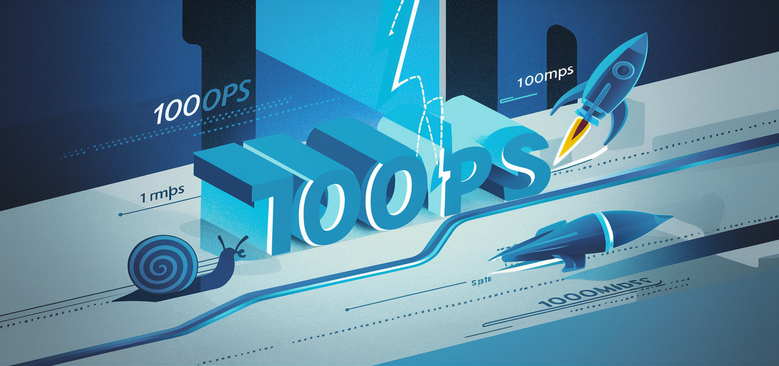Is 100Mbps Fast?
Is 100 Mbps fast?
As internet connection speeds do not seem to stagnate and are instead increasing at an even greater rate, many are left to question if 100 Mbps is still actually fast internet. Thanks to the ever-increasing streaming, gaming, and browsing that need more bandwidth than before, ISPs are providing plans that go as high as 1 Gigabit or even more. Now, because 100 Mbps is a relatively higher speed of connection, just where does it place itself on the slow versus fast internet spectrum?
What is 100Mbps?
As mentioned, 100 Mbps means 100 megabits per second, which means the speed and bandwidth of an internet connection. It defines the number of data units that can be moved in a second, which is expressed in megabits. The speed of 100 Mbps means that data transfer is in millions of bits, or, in other words, 100 megabits of data per second.
In layman's terms, let me state that with a 100Mbps connection, one can download a 750MB video file in one minute. For instance, while using a 25 Mbps connection, a file of the same size will take about 5 minutes to download, and a 400 Mbps connection would take less than 30 seconds to download the same file.
So, is 100 Mbps fast?
The legitimacy of 100 Mbps Internet can be considered fast depending on what tasks are performed on the Internet and how many devices are connected to the Internet.
For people who rarely go online to open Yahoo Mail, Facebook, and Twitter accounts, open YouTube, or download simple stuff, 100 Mbps is very fast. Internet speed is quite adequate for several users to listen to music, watch videos, shop online, post pictures, and more without any slowdown. It is quite evident that even while connecting 10+ devices, the performance of a 100Mbps connection would not be significantly impacted due to these lightweight processes.
However, for moderate to heavy internet usage, 100 Mbps is barely scratching the surface of what can be considered quick without bordering on slow territory. Tasks of a moderate level, such as streaming HD videos or playing online games, will be fine with 100 Mbps. In this regard, the connection speed may sometimes appear slow if other bandwidth-intensive processes are running in parallel across multiple gadgets, such as streaming, video calls, and gaming.
The higher the bandwidth consumption of media and tasks that are assigned to it, the greater the workload of a 100 Mbps connection. It is for this reason that 100 Mbps can hardly be considered an extremely or blazingly fast internet speed but more of the ‘fast enough’ type for most households.
The Case for Why 100 Mbps is No Longer Fast Enough
There are people whose home networks and usage requirements mean that 100Mbps is not seen as sufficient to cope with, as higher speeds are offered.
Here are some examples that require speeds above 100Mbps Mbps: Here are some examples that require speeds above 100Mbps Mbps:
HHigh-high-bandwidth activities that occur frequently, such as streaming, gaming, tabling, and computing as well as utilization of connected home devices like smart home devices, security cameras tablet,s and computers with the connectivity of over a dozen, may sometimes overload a 100 Mbps connection.
Hosting at 200 Mbps or above will provide smooth and uninterrupted gaming, streaming for gamers & streamers at maximum speed & quality. Multiplayer gaming and live streaming are quite bandwidth intensive so 100Mbps is usually the bare minimum.
Couples and children using 4K movies and videos on 3+ devices at once can experience some lag and buffering even at 100 Mbps, as 4K streaming demands 25 Mbps+ per stream, minimum.
Employees making lots of file transfers, conducting long video conferences, or connecting to remote networks using VPN will need 200–300 Mbps of both upload and download speeds.
On this list of gigabit internet plans that carriers offer, which provides speeds of up to 1,000Mbps, a connection of 100Mbps does not feel nearly as fast. But truly speaking, today’s most American households opt for approximately 100 Mbps of broadband as sufficiently sufficient for all their essential usages.
How Fast is 100Mbps Internet Service Fast enough for You?
Determining if 100Mbps meets your household’s internet speed needs depends heavily on these factors: Determining if 100Mbps meets your household’s internet speed needs depends heavily on these factors:
1. Computers, phones, TVs, game consoles, and any other smart devices that can be easily connected.
2. number of active users throughout the day at the highest usage period.
3. The availability of bandwidth tosupporte various activities such as streaming, gaming, and video calls.
4. In general, the use of the internet in terms of the number of activities and the time spent on them.
5. Fluctuations in high-speed internet availability and its affordability
Self-scoring for home-based activities and if you believe 100Mbps has begun to slow down the process, then you should have a word with your ISP about the need for a better package. However, for a significantly significant number, the speed offered even 5–10 years ago is still sufficient in 2023 for a seamlessly connected home.
Looking for top-quality entertainment? Contact us today at (469) 213-7481 and enjoy Satellite TV at its finest!


